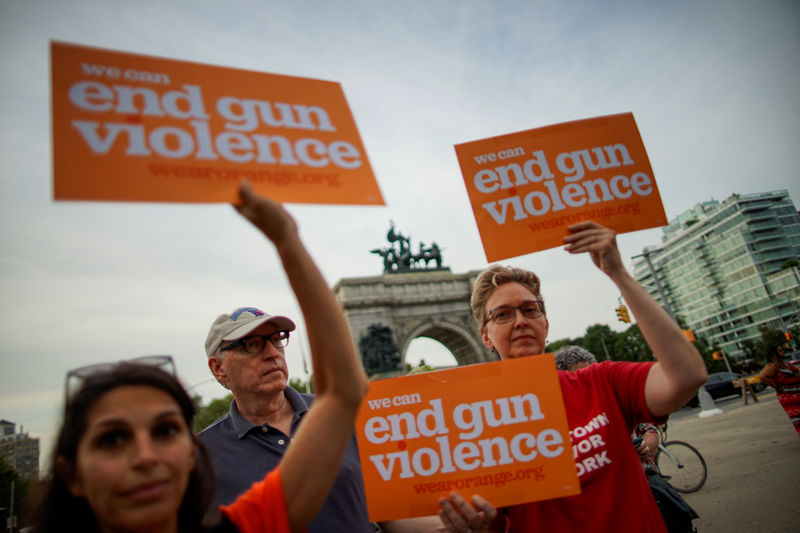(Reuters) - A cluster of recent mass shootings that killed 36 people in California, Texas and Ohio has sparked renewed calls for the U.S. Congress to pass legislation to prevent gun violence.
While Democrats want the Senate to interrupt its five-week summer recess and return to Washington to address the matter immediately, Senate Majority Leader Mitch McConnell, a Republican, has not acted on the request.
Instead, there will likely be moves to advance legislation when Congress returns from summer recess on Sept. 9.
Previous attempts to pass gun controls after mass shootings, including in the aftermath of the December 2012 murder of 20 children and six staff members at the Sandy Hook Elementary School in Newtown, Connecticut, have mostly failed in the face of fierce lobbying by the National Rifle Association and other gun groups.
Here are some proposals that could be debated in coming months:
GUN SALE BACKGROUND CHECKS
The Democratic-led House of Representatives in February passed legislation to expand background checks on gun buyers. A current loophole in federal law allows many sales -- perhaps as many as one-fifth -- over the internet and at gun shows to go unchecked.
While the bill was touted as being bipartisan, only eight Republicans backed it, with 188 voting no. That does not bode well for the bill's prospects in the Republican-controlled Senate.
Republican Senator Pat Toomey and Democratic Senator Joe Manchin are trying to resurrect a somewhat weaker version of the bill, which the Senate defeated in 2013. It exempts from background checks all gun transfers, including sales, between close family members. The House-passed bill only exempts loans and gifts of firearms between such relatives.
Also passed by the House in February but going nowhere in the Senate is a Democratic bill to extend to 10 days, from the current three business days, the amount of time for a background check if information on an individual is incomplete.
'RED FLAG' LEGISLATION
Senate Judiciary Committee Chairman Lindsey Graham, a Republican, and Senator Richard Blumenthal, a Democrat on the panel, want to create a federal grant program helping states adopt "red flag" laws. These would allow courts and local law enforcement to remove guns from people who are deemed to present an imminent risk of danger to communities.
Under the procedure, for example, family members or neighbors of a person thought to be owning weapons and a potential danger could tip off authorities, starting the legal process.
COMBATING 'LIE AND TRY'
Bipartisan legislation in the Senate would require that state and local law enforcement be quickly notified by the National Instant Criminal Background Check System (NICS) when someone prohibited from purchasing a gun attempts to do so.
Currently, 37 states and the District of Columbia rely on NICS to conduct their background checks on gun sales, while the rest do it themselves.
Backers of the bill say "lie and try" incidents can be a warning sign of additional criminal behavior by individuals.
As with most gun-related bills, there is no certainty that it will make it through Congress.
ATTACKING VIOLENT EXTREMISM
The Department of Homeland Security's "Countering Violent Extremism Grants" program has withered under the Trump administration.
The $10 million federal program was aimed at helping state and local government agencies and nongovernmental organizations, or NGOs, work to stop "extremist" groups from engaging in violence, including mass shootings by followers.
Shortly after coming to power in 2017, the Trump administration proposed eliminating the program and since then the grants have withered.
Upcoming spending bills for fiscal 2020, which begins on Oct. 1, could change that but prospects are unclear.
The El Paso, Texas, shooting, which was apparently inspired by racial hatred, has sparked some calls in and out of Congress for funding of the DHS office. Democratic presidential candidate Pete Buttigieg has floated a series of proposals to curb domestic violence, including a revitalized DHS office.
IMPROVING MENTAL HEALTH PROGRAMS
Republicans and the gun industry have argued that gun violence is rooted in psychological illness and that federal resources should be oriented toward treatment as a way of preventing mass shootings.
"Mental illness and hatred pulls the trigger, not the gun," President Donald Trump said on Monday in a speech to the nation, blaming the violence on "mentally ill monsters."
In the past, congressional Republicans have called for beefing up federal funding of research and treatment of mental illness as a response to gun violence.
Their opponents cite studies showing that just a small percentage of mass shootings can be tied to mental illness and counter that focusing on it is a diversion from tighter gun control laws.
BANNING SEMI-AUTOMATIC WEAPONS
For years, gun control advocates have urged the prohibition of semi-automatic assault rifles that fire rapidly and can carry large magazines of ammunition. They were modeled on guns designed for military use.
But many Republicans and the gun lobby have fought off such attempts as a violation of the U.S. Constitution's Second Amendment providing the right to bear arms.

A group of House and Senate Democrats is urging passage of legislation they introduced in February to ban high-capacity magazines holding more than 10 rounds of ammunition.